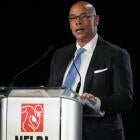C.J. Gardner-Johnson says Eagles traded him because they were 'scared of a competitor'
Gardner-Johnson insists teammates had no issue with him -- only the front office did

C.J. Gardner-Johnson was traded to the Houston Texans just a month after helping the Philadelphia Eagles win Super Bowl LIX, a move widely seen as a salary cap dump. But the outspoken safety saw it differently. Gardner explained his perspective on "The Pivot" podcast, saying the Eagles didn't move him for financial reasons -- they moved him out of fear.
"Scared of a competitor," Gardner-Johnson said. "Simple as that. ... You can't program a dawg."
Gardner-Johnson pointed to the Week 16 matchup against the Washington Commanders, where he was ejected in the second half after receiving his second unsportsmanlike conduct penalty -- an automatic disqualification under league rules. He suggested that moment, along with a heated practice incident during the postseason, may have shaped how the organization viewed him.
"We had a little scrum at practice," Gardner-Johnson said. "Nothing, just offense versus defense, but who's the culprit of it? Me. I guess, because we're competing. Well, you tell me the period is live. You're telling us not to compete during a live period, but it's a live period, and we're getting ready for a playoff game?"

Still, Gardner-Johnson insisted the friction never came from within the locker room -- only from higher up.
"You want me to be a leader and outspoken, but then you want me to sit back," Gardner-Johnson said. "There's nowhere been a locker room where I had a single issue with a teammate."
Gardner-Johnson had signed a three-year, $27 million deal with the Eagles in March 2024, making a return to the franchise he helped guide to an appearance in Super Bowl LVII as the NFL's co-interceptions leader during the 2022 season.
Johnson started every game for Philadelphia last season, registering 59 total tackles while matching a career-high six interceptions.
Philadelphia general manager Howie Roseman addressed the trade back in March at the NFL's annual meetings, calling it a tough decision but one made with the long-term roster in mind and aimed at maximizing team-building flexibility.

















